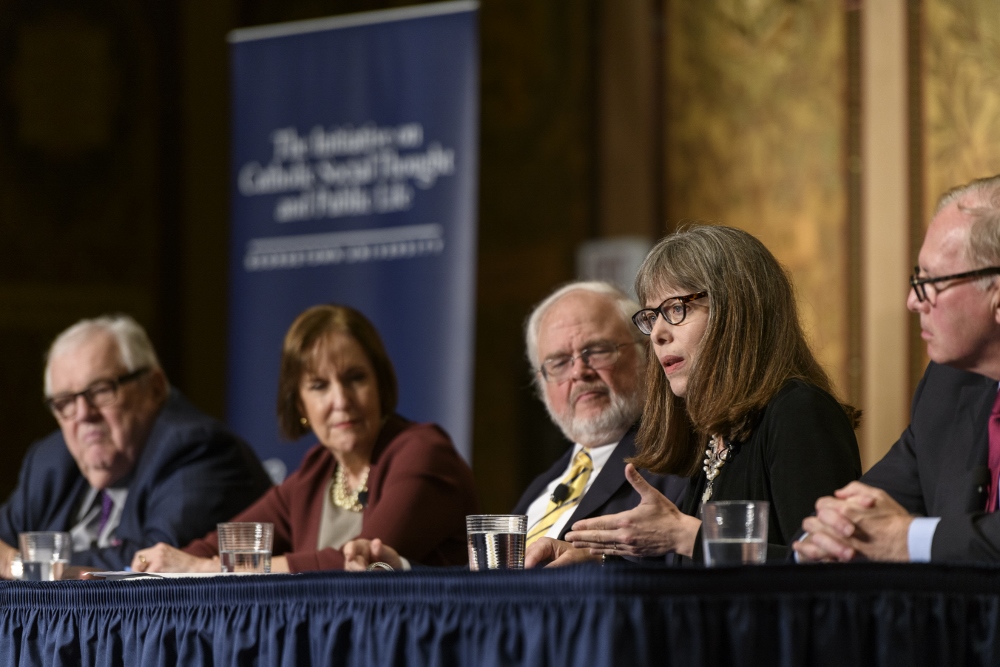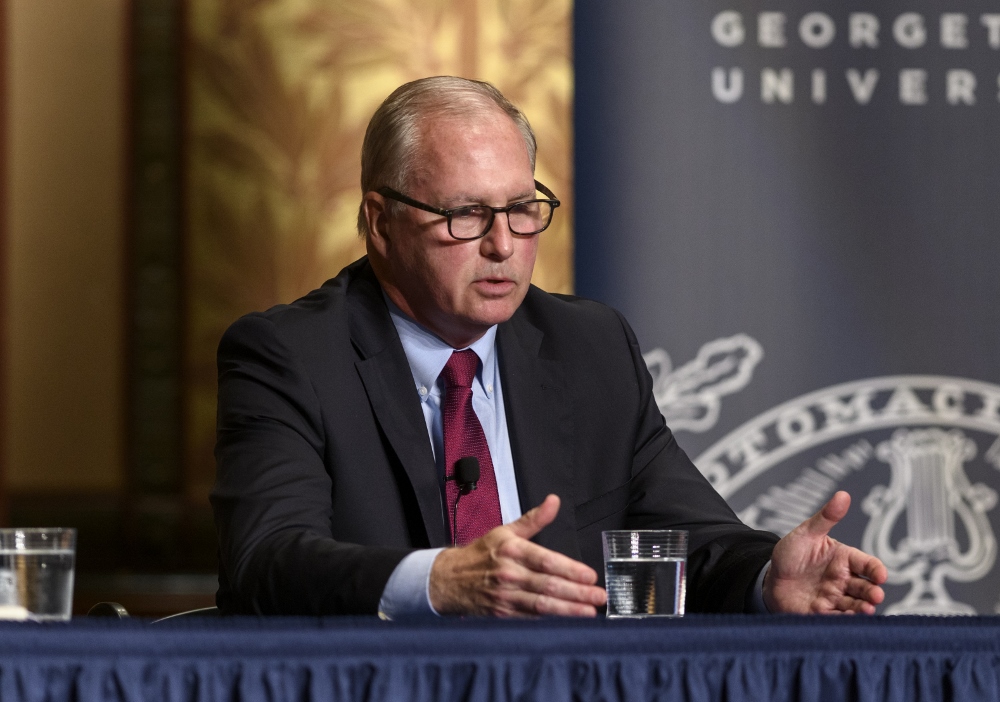
Speaking on the panel of "Confronting a Moral Catastrophe: Lay Leadership, Catholic Social Teaching, and the Sexual Abuse Crisis" at Georgetown University in Washington, D.C., Sept. 25 were (from left): Robert Bennett, Karen Tumulty, John Carr, Dawn Eden Goldstein and Kevin Byrnes. (Georgetown University/Rafael Suanes)
Sept. 25 was a night of powerful admissions in a packed lecture hall at Georgetown University. Perhaps that was not surprising, given the topic up for discussion — "Confronting a Moral Catastrophe: Lay Leadership, Catholic Social Teaching, and the Sexual Abuse Crisis."
Still, those in the audience of the latest dialogue put forward by the Initiative on Catholic Social Thought and Public Life could not have been fully prepared for the alternating tones of anger and anguish that characterized the evening's conversation.
Panelists included a theologian, a Catholic journalist, a past member of the U.S. bishops' National Review Board for the Protection of Children and Young People, and a survivor of priestly sexual abuse, whose witness was both devastating and, ultimately, rousing in a way that only the words of someone speaking real truth to power could be.
The initiative's associate director, attorney Kim Daniels, began her introduction by not mincing words, referencing disgraced former Cardinal Theodore McCarrick's "awful predation" and demanding healing for survivors of abuse, reform of the church's clerical culture, a larger role for the laity, and a renewal of the church.
In an extraordinary moment, as the evening wound down, John Carr, director of the initiative and former adviser to (and friend of) such fallen churchmen as McCarrick and Boston Cardinal Bernard Law, confessed to having himself been a victim of sexual abuse and harassment at his high school seminary, an acknowledgment he had yet to make even to his own children. He wondered aloud whether his own silence may have inadvertently led to the abuse of others after him.
He also recounted a 2015 conversation with Archbishop Carlo Maria Viganò, at the time papal nuncio to the U.S., concerning the removal of Archbishop John Nienstedt of St. Paul-Minneapolis for not doing more to protect young Catholics from predator priests and because of sexual misconduct allegations against Nienstedt himself.
Carr recalled Viganò's response — "We cannot give in to the enemies of the church, the media, the attorneys, and others who oppose the church" — as a cautionary tale about letting powerful men in the church use this crisis to settle political scores with Pope Francis.
The revelations were among many that Carr said have "haunted" his service to the church for more than 50 years. He told of serving the late Cardinal James Hickey in Washington, being present when church lawyers advised Hickey not to meet with families of the abused but rather to make confidential settlements.
Advertisement
"Several of us reminded the cardinal he was a pastor, not a risk manager," Carr said. He described bishops as "isolated," lacking in "anguish," and "surrounded by people who reinforce their judgments," rather than parents, survivors and women advisers.
Carr also admitted to failing to suspect McCarrick could be capable of abuse, saying at the time it was "inconceivable" to him that the rumors surrounding the cardinal could be true. Still, Carr asked him about it directly. Carr recalled that McCarrick "looked me right in the eyes" and said, " 'If that were true, I would not be here.' "
As much as Carr admires Francis, he did not spare him from criticism, saying he has been too slow to act in these matters, a reticence he said "may be spiritually defensible but is pastorally harmful." The church and the people of God deserve "leadership that listens, responds and acts decisively, openly and quickly to bring about genuine accountability, reform and renewal."
Well before Carr made those remarks came the quiet but devastating testimony of civil and criminal trial attorney Kevin Byrnes, who opened and closed the dialogue. He began with the story of his repeated molestation by a priest when he was 8 years old and his subsequent betrayal by his father and mother, who beat him with a strap when he told them about it.

Attorney Kevin Byrnes, a survivor of clergy sexual abuse, speaks during the dialogue "Confronting a Moral Catastrophe: Lay Leadership, Catholic Social Teaching, and the Sexual Abuse Crisis" at Georgetown University Sept. 25 in Washington, D.C. (Georgetown University/Rafael Suanes)
Having recognized that neither his parents nor the church would protect him, Byrnes described a history of addiction, broken relationships and a suicide attempt because of the "spiritual incest" perpetrated upon him, a lifetime of waking in the night wondering, "My God, my God, why have you forsaken me?" The room was silent.
"That's all I've got, John," he said quietly, and was applauded.
Panelist Dawn Eden Goldstein, assistant professor of theology at Holy Apostles College and Seminary, gave an account of her adult conversion to Catholicism, despite having been molested by a janitor at her synagogue when she was 5 years old. Goldstein joked that it was during a discussion of Catholic writer G.K. Chesterton that she determined she had to convert.
"I realized if every human believed and practiced what the Catholic Church teaches about human dignity," she said in response to Carr's question of why she would join such a wounded church, "I wouldn't have suffered abuse; no one would suffer abuse."
An original member of the bishops' National Review Board, attorney Robert Bennett spent two years investigating the church, a process he called "a shocking experience" that left him and his fellow members "totally depressed," both by the scope of the abuse — which they quickly determined was not a media exaggeration — and by the bishops' indifference to it.
Bennett, who was simultaneously angry and funny, described an attitude of "This, too, will pass," on the part of the bishops, and said, "Until the laity takes on the hierarchy, there's never, ever going to be a change."
He added, emphatically, "What we have to do is realize we are the church. They're not the church, we are the church."
'What we have to do is realize we are the church. They're not the church, we are the church.'
—Robert Bennett
As a parishioner — "the person in the second pew," Carr called her — Washington Post columnist Karen Tumulty has struggled with why she remains in the church, despite everything she knows, despite what she believes has so far been only "lip service" to empowering the laity to take on this challenge.
Still a parishioner at the Shrine of the Most Blessed Sacrament in Washington, the parish home to many of the city's political elite, Tumulty said being Catholic is part of her identity, a source "of peace and strength."
She also admitted that she turns in an empty envelope every week during the collection, "so they know I'm there."
If the power of Byrnes' opening remarks did not dispel the notion — for the 500 or so people in the rapt attendance, if not for Byrnes himself — that he is "damaged goods" or "the broken one" on the panel, as he described himself, then his closing remarks surely did. For it was Byrnes who was given the last word by Carr, a show both symbolic and actual that the church must finally give a full hearing to the victims of priestly abuse.
Saying that the church has forgotten that "the blessed among us are the meek, the poor, and the misbegotten, not the rich and well-heeled," Byrnes took on a questioner who said he was just playing devil's advocate by suggesting that some groups might be using the scandal as a pretext to bankrupt the church.
"You told us we were liars," Byrnes said of the church's response to the crisis. "And maybe, given that, I'm not sure you should survive as an institution."
The gathering was co-sponsored by Georgetown's Office of Mission and Ministry and the Berkley Center for Religion, Peace and World Affairs. More on initiative programs and videos of past events are on its website.
[Julie Bourbon is a freelance writer based in Washington, D.C.]





